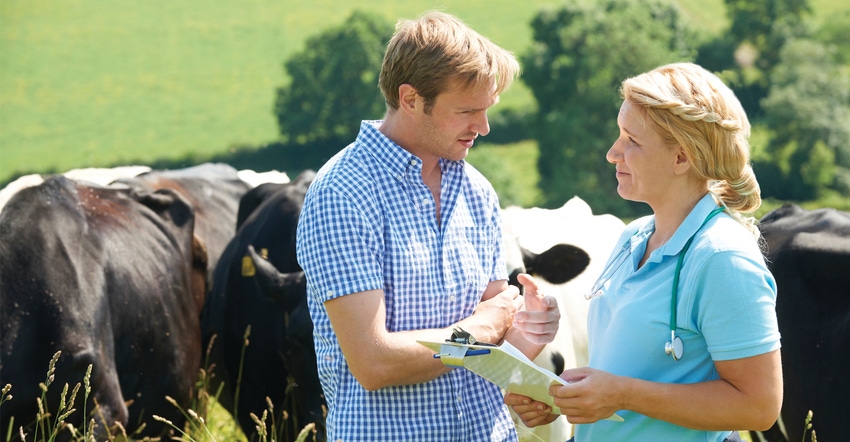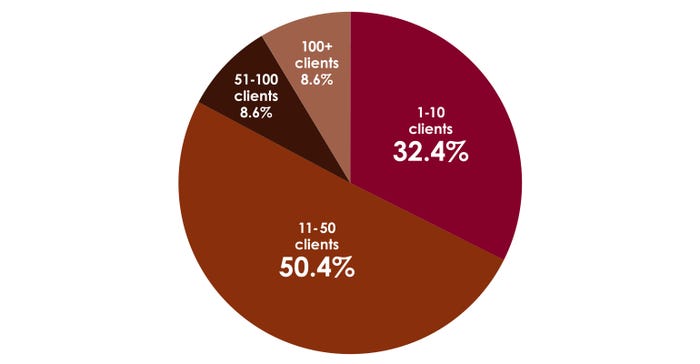Bovine vets taking financial hit from other service providers
New report says competition from non-veterinary sources pose potential profitability threat.
August 25, 2017

By Barbara Dutton
What happens to a bovine veterinary practice when other services providers begin offering services in their market?
A recent report produced jointly by the American Association of Bovine Practitioners (AABP), Ashland, Ohio, and the American Veterinary Medical Association (AVMA), Schaumburg, Illinois, suggests that competition from a variety of sources other than traditional bovine veterinary practices pose potential profitability implications.
A range of alternative providers is reported by the American Association of Bovine Practitioners Economic Report 2016 as diminishing bovine practitioner earnings. The report, which presents survey data, discusses effects of such competition – referred to as parallel service providers (PSP) – in terms of potential to erode the revenues and incomes of local bovine veterinary practices.
AVMA Director of Veterinary Economics Michael Dicks, Ph.D., who has a background in agricultural economics and policy as well as experience in raising cattle, explains: “Parallel providers offer their service for a lower price because they don’t have the investment in equipment, facilities or education that veterinarians do, and set the expectations of animal owners very low in terms of costs of services.”
Although, according to David Welch, DVM, a private practitioner in Berlin, Penn., the phenomenon is not new, it’s more pronounced. “Services provided by parallel providers have always been with us. In recent years the competition has become more intrusive.”
Services are being provided by pharmaceutical representatives, feed consultants and other industry stakeholders. “Livestock owners view this as being free,” Welch observes.
The big picture
The economic report says among bovine veterinarians who were asked whether they believed they’d lost income to other kinds of service providers, more than 60% deemed business had been siphoned off by PSPs. Among practice owners the rate was even higher.
“Nearly 87% of business owners acknowledged that PSP activities harm the performance of their practices,” observes AVMA Economic Analyst Frederic Ouedraogo, Ph.D. “More than 60% of the affected owners believe that people operating route trucks delivering supplies to farms are a threat,” he adds.
More than half of the overall survey group claim to have been affected by this form of competition.
Nearly half of the affected respondents pointed to people practicing without a veterinary license as negatively affecting their business. Of affected owners, observes Ouedraogo, 60% indicated the same. More than 44% of those affected in the group surveyed cited consultant veterinarians who make annual farm visits as making inroads. “About 26% of practice owners said that each time a consultant visits a farm and writes a script,” notes Ouedraogo, “it is a job taken away from them.”
Not only is the potential recognized for PSP activity to cause financial harm, including threatening the existence of bovine practices in some rural locales, but to diminish animal welfare.
“Veterinarians are the only professionals who have received training in all aspects of animal health -- nutrition, reproduction, parasite and disease management and medical treatment,” explains Dicks. “Parallel service providers may be trained in one specific area and unaware of the impact of their recommendations in this area on the other components of animal health.”
As Welch observes, “Sometimes recommendations by industry reps focus on one area of management and do not take into account the big picture.”

Bovine veterinarians were asked: Approximately how many clients do you think you are not seeing because of non-veterinary service providers?
In the loop
To help quantify the effect of PSPs, a survey question described in the report asked about changes experienced in client volume. More than half of those respondents claiming business was affected by PSPs estimated that they lose between 11 and 50 clients each year due to such competition. Respondents also reported a drop in the number of animals they service because of PSPs.
“A considerable number of practitioners cite a decline in the volume of cow-calf pairs to which they attend each year,” notes Ouedraogo, “and a lesser, though still important number observed a decline in the number of feedlot animals they are ... seeing.”
While such a trend can squeeze profits among bovine veterinary practices, Dicks foresees it also presenting a risk to veterinary clients, further contributing to a downward cycle in the marketplace.
“In the long run, livestock owners will have higher disease and illness incident, require more medical treatment and see a greater culling rate,” Dicks explains. “This lowers the value of the animals and the ability to purchase veterinary services from a veterinary provider.”
Understanding this value can help beef vets meet competitive challenges, suggests Welch.
“Veterinarians need to understand the concept of the value stream and how it applies to the livestock owner,” he says. “Understanding this concept will help us formulate integrated interventions that will best benefit the livestock owner, while keeping the practitioner in the loop and ensuring the sustainability of the veterinary practice.”
Welch, who says in the past PSPs shared information about their activities with local practitioners, sees a troubling change in trend.
“Now,” he observes, “more often than not, the visits are communicated to the practitioner by the farmer himself after the fact.”
At the end of the day, however, Welch declares, “Veterinarians are the profession on the farm that have the best grasp of the biological processes involved – from planting through crop harvest to the point of marketing of beef.”
He says to counter business erosion by PSPs, bovine vets should concentrate on delivering value.
“Understanding the needs of the client is the best point to start," he says. "Once we understand the needs, we can develop a plan statement to develop and provide new services.”
Dutton is economics writer for the American Veterinary Medical Association.
You May Also Like


.png?width=300&auto=webp&quality=80&disable=upscale)
